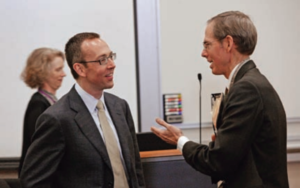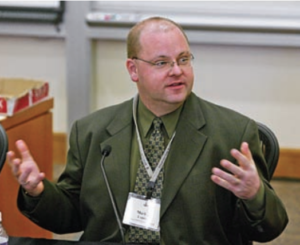Biotech Patent Experts Gather at Law School
Biotechnology patent law is one of the hottest fields in the legal profession, and one of the most challenging. Not only does it require a specialized knowledge of a complex, fast-changing science, but it presents attorneys with particular problems when cases are brought to jury trial.

Whyte of the U.S. District Court for the Northern
District of California discuss biotech jury trials.
One of the challenges is picking a jury. Attorneys trying biotech cases find they must employ different techniques than those used in other patent cases, said Edward Reines, a partner at Weil, Gotshal & Manges in Redwood Shores, California, speaking at the law school’s March 11 conference, Biotechnology and Intellectual Property: Current Controversies. Reines, a member of the panel discussing biotechnology trials, stressed that the voir dire process is crucial to ensure that potential jurors are not predisposed against one’s client because of religious or health issues. “You can only mute people’s predisposition to a certain extent.” The conference, the second organized by the school’s new Center for Law and the Biosciences, convened more than 100 lawyers, judges, and academics from around the nation, all of whom are feeling their way through this emerging area of the law. Nearly 30 panelists covered varied legal issues in biotechnology: licensing, gene patents, the written description requirement for patents, ethical and policy issues, and standards for trying IP cases. The complexity of biotechnology science also presents problems at trial. Some of the technologies involved in these cases are so obscure and over the jurors’ heads, the panelists said they find they need to step back during a trial to give some background. “The court can help the jurors a lot by pre-instructing the juries,” said Judge Ronald Whyte of the U.S. District Court for the Northern District of California. “Attorneys can give interim commentary between witnesses; they can say, ‘Dr. Smith will explain,’ and introduce the issue.” Daralyn Durie (BA ’88), a partner at Keker & Van Nest in San Francisco, cautioned that a trial has limitations: “You’re never going to teach a jury college-level classes in biotech,” she said. “You have to teach them only what they need to know.” While expert witnesses may be able to help clarify the science, they can also obscure it, the panelists noted, so attorneys need to be careful with the experts they introduce.

The best witness of all, panelists agreed, is the person who conducted the research. “Probably the most powerful expert you can have is someone who was there doing the work in the field,” said Sean Johnston ’89, vice president of intellectual property at Genentech, Inc. in South San Francisco. Besides the ethical issues of gene manipulation, science that jurors—and lawyers—often fail to comprehend, and witnesses who spout questionable data, biotech IP attorneys face perhaps a greater challenge: representing a client who wants to restrict access to a medical breakthrough. While patent laws exist, of course, to encourage innovation, the lawyers arguing to protect intellectual property sometimes find themselves in an awkward position. “With biotech, there’s a public benefit, but you’re also attempting to restrict that benefit,” Reines said. “You need to come up with a strategy to balance that paradox.” —Mandy Erickson
